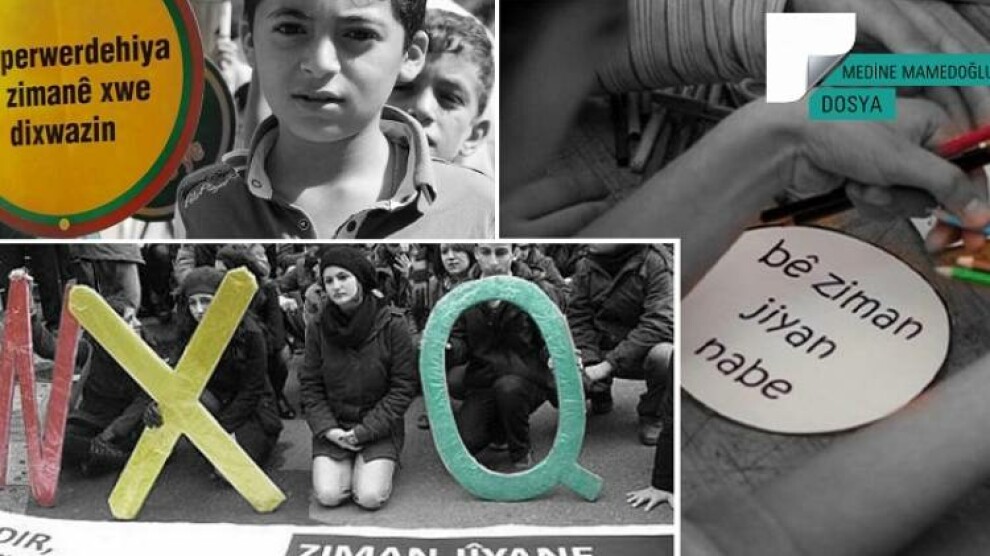International Mother Language Day: Kurds face pressure, attacks, lynch attempts, hate speech

MEDİNE MAMEDOĞLU
Amed- International Mother Language Day is held on 21 February every year. First UNESCO announced it but 40% of languages spoken nowadays all around the world are in danger of disappearing. In Turkey, many Kurdish language schools and courses such as Ferzad Kemanger Primary School, KURDİ-DER and Dibistana Seretayî Bêrîvan were shut down particularly in the last five years. Kurdish people have faced pressures for speaking their native languages. Some Kurds were stabbed or even killed in the street. We have written a news file for you about International Mother Language Day. In the first section of the file, we talk about the history of the day, the endangered languages, how the situation is in Turkey, and the ongoing pressures on the Kurdish languages. In the second and third sections of the file, we will share the interviews about the mother language day with you.
The International Mother Language Day was first announced by the United Nations Educational, Scientific, and Cultural Organization (UNESCO) in 1999, and it is held on 21 February every year since then. It has been observed throughout the world since February 21, 2000, to promote awareness of linguistic and cultural diversity and to promote multilingualism. The declaration came up in tribute to the Language Movement done by the Bangladeshis. Pakistan declared that the Urdu language was the official language of Pakistan even though Bengali or Bangla was spoken by the majority of people combining East Pakistan (now Bangladesh). Bangladeshi people demanded Bangla to be at least one of the national languages in addition to Urdu. The university students arranged massive rallies and meetings known as “Bengali language movement”. On 21 February 1952, police opened fire on rallies and many people were killed and hundreds were injured. Since then Bangladeshis celebrate International Mother Language Day as one of their tragic days. A formal proposal was submitted to UNESCO to take a step for saving the world's languages from extinction by declaring an International Mother Language Day.
40% of languages are in danger of disappearing
More than 7,000 languages have been spoken in the world and 40% of languages spoken nowadays all around the world are in danger of disappearing. Papua New Guinea is the most linguistically diverse country in the world. Despite a population of just more than 8 million, Papua New Guinea comes in first with a total of 840 languages spoken across the country. North Korea is the least linguistically diverse country in the world, according to the data shared by UNESCO's Atlas of the World's Languages in Danger. As for Turkey, the atlas says that 15 languages are endangered, and three more are extinct. Ubik, Mlahso, and Cappadocian Greek are extinct in Turkey while Hértevin, Assyrian , and Ladino languages are critically endangered. Abaza, Homshetsma, Laz, Pontus Greek, Romani, Suret, and Western Armenian are in danger of disappearing. Zazaki, Abkhaz, Adyge, and Kabard-Cherkes have been categorized as unsafe by the atlas.
Restrictions on the use of the Kurdish language
Turkey approved the Declaration on the Rights of Persons Belonging to National or Ethnic, Religious and Linguistic Minorities adopted by General Assembly resolution 47/135 of 18 December 1992. Even if Turkey has approved the UN declaration, Article 42 of the Turkish Constitution goes further by stating that, “Aside from Turkish, no other language shall be studied by or taught to Turkish citizens as a mother tongue in any language, teaching, or learning institution.” Several regulations have been made on language courses and optional subjects for the teaching of other languages but these regulations haven’t been supported by the state in practice, and those who use a language other than Turkish are subjected to various pressures, attacks, lynch attempts, and hate speeches.
Father was killed for saying “we are Kurds”
Kurdish people living in Turkey have faced pressures for speaking their native language but they have struggled against these pressures for years. In the 1990s, mothers were forced to speak Turkish while visiting their children in prisons, and several films were shot about their situation. These pressure policies never end even in 2021. Some Kurds were killed; some of them were subjected to lynch attacks for speaking Kurdish or singing Kurdish songs. For instance; on December 16, 2018, a father and his son were attacked for saying, “we are Kurds”. Father Kadir Sakçı was killed and his son Burhan Sakçı was seriously wounded.
Institutions were shut down
Kurdish language institutions also faced pressures. Ferzad Kemanger Primary School was opened in 2014 for children aged between 5 and 11 to give Kurdish education. The school was shut down on October 9, 2016. Kurdish Language Research and Development Foundation (KURDİ-DER), which had 37 branches across Turkey were shut down by an emergency decree. Dibistana Seretayî Bêrîvan was a primary school opened in Cizre in 2014 to give Kurdish education. The school was shut down by the trustee appointed to the Cizre Municipality. Üveyş Ana Primary School was opened in Yüksekova by KURDİ-DER. The school had 800 students but the appointed trustee to the municipality suspended its activities.
Kurdish school built by people in Lice was demolished
A four-story Kurdish school was builtin the Yalaza (Kerwas) village of Diyarbakır’s Lice district by the people but the school was demolished by heavy construction equipment on April 12, 2017, within the scope of military operations launched during the curfew imposed in the district. NGOs such as Ehmedê Xanî Language Academy, Kurdish Writers’ Union were also shut down by an emergency decree issued under the state of emergency. Daycare center named Zarokistan and other daycare centers/kindergartens, providing Kurdish education, were also closed down by the appointed trustee.
TOMORROW: Kurdish language should be kept alive everywhere
